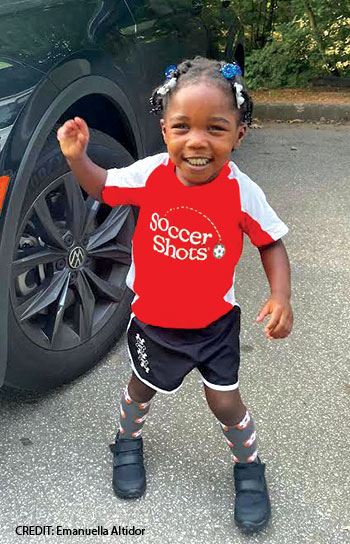
Justice can do all the things many four-year-olds can do, like play soccer, thanks to an incredible team of healthcare experts, scientists, and engineers from Emory University, Children’s Healthcare of Atlanta, and the Georgia Institute of Technology.
Because the modeling program uses red to highlight areas of airway obstruction, it’s easy for families to visualize the impact of surgery. Ms. Altidor said she and her husband appreciated the time the team spent explaining the procedure to them. “We felt we were partners,” she said. “We were working together and collaborating.”
Explore This Issue
October 2024The family was concerned about how long it might take to obtain FDA approval. But the process didn’t take as long as they feared.
“To the FDA’s credit, they recognize that getting a device like this fully approved may take 10 years, sometimes longer. So, if there is someone with critical health issues who could potentially benefit from the device, the FDA is willing to review each individual case,” Dr. Maher said. Because time is of the essence, turnaround times can be less than a week.
A challenge in Justice’s case is that she did not have a tracheostomy, the traditional standard of care. “You have to demonstrate that there’s nothing else clinically available that would benefit the patient,” Dr. Goudy said. “So, historically, these implants were only offered to patients who had tracheostomies and still were not doing well. Justice didn’t have a trach, but we didn’t want to put one in.”
Fortunately, the FDA approved the custom 3D-printed splints for use in Justice. She underwent implantation of the devices on October 6, 2020, in a multidisciplinary surgery involving cardiology, otolaryngology, and pulmonology. One month later, after gradual weaning from oxygen, Justice went home with her parents and sister.
Advancing the Treatment of Tracheomalacia
Within 18 months of surgery, Justice, a child who’d previously been dependent on a feeding tube for nutrition, began enjoying food. It took time—and multiple speech therapy sessions—because Justice, like many children who have been intubated since birth, had developed an oral aversion and didn’t want anything near her mouth at first. Surgical placement of the custom 3D-printed external tracheal splints allowed her to avoid a tracheostomy and enjoy food and freedom of movement.
That’s a significant step forward in the treatment of severe tracheomalacia. Initially, custom-printed 3D-airway splints were only used to treat patients who were extremely unstable despite tracheostomies and mechanical ventilation. But as physicians witnessed the positive impact external airway splints could have on children and